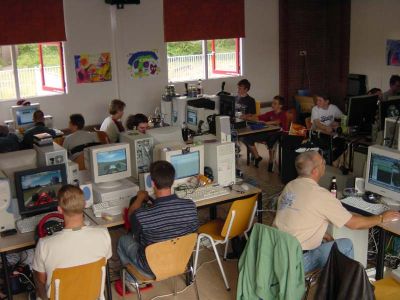Multiplayer games, whether it be porn games, mainstream games, or hybrid games, undoubtedly attract a crowd. Well, that is why they are called “multiplayer.” That aside, multiplayer games have a deep rooted history in connecting all types of people from every place on the planet. The forging of social bonds through gaming is one the industry’s most positive contributions to the world.
In this article, we’ll dive into the fibers that make up social gaming networks and connectivity through multiplayer experiences.
The History of Multiplayer Gaming
The history of the multiplayer gaming experience is both rich and fascinating. If you’re old enough, you’ll likely hold some of these memories near and dear, but you don’t have to admit your age to us, we’re not counting anyways.
Local Multiplayer Setups
The first known multiplayer gaming experiences resided in actual local spaces. Its hard to imagine, but people used to gather at someone’s home and connect multiple remotes and play in sync. Think of Pong, Spacewar, and the numerous Nintendo classics, such as the Super Mario Bros. franchise.
There was something to be said for playing together and actually being together. But of course, things developed from there.
LAN Parties

Local Area Networks (LAN) revolutionized the multiplayer gaming experience. And LAN parties became an actual thing.
The image above is probably super un-relatable to today’s youth. But in terms of multiplayer gaming, that was the standard.
LAN parties became a popular phenomenon, with gamers bringing their computers together for intense multiplayer sessions. Games like “Doom” and “Quake” brought fast-paced action to LAN parties, fostering a sense of camaraderie and competition among players.
Online Multiplayer – Now It Gets Real
Internet access changed everything in the world. In gaming, it was the advent of moving from the LAN party to the online gathering where players need not be near one another to enjoy a good gaming time.
Games like “Ultima Online” and “EverQuest” introduced massive multiplayer online experiences, where players could explore vast virtual worlds and connect with individuals from around the globe. Online multiplayer not only provided a platform for cooperative gameplay but also facilitated the formation of dedicated communities centered around specific games.
The Online Multiplayer revolution was also a setup for several modernizations and new eras in gaming.
The Multiplayer Console
Enter Xbox and PlayStation. Microsoft and Sony weren’t going to sit by idle and allow the multiplayer gaming opportunity to pass them by. Instead, they began making powerful consoles that adapted and revolutionized the capacity for shared online gaming experiences.
Using Xbox and PlayStation, gamers could engage in multiplayer battles, cooperative missions, and sports competitions without leaving their homes.
Online Multiplayer – It Got Better
Streaming platforms such as Steam, alongside modernizations to Xbox Live, began to offer streaming gaming which connected players in a more streamlined fashion. This is when the gaming experience became sticky as people found friendships and even romance.
But moreover, gaming suddenly became an arena experience.
Games such as “League of Legends,” “Counter-Strike: Global Offensive,” and “Overwatch” have captivated millions of viewers worldwide, solidifying the multiplayer gaming experience as a spectator sport.
Its clear that the evolution of technology and the changing landscape of connectivity have shaped the multiplayer gaming experience. We’re reaching farther and broader and connecting more deeply all over the world. And none of that appears to be slowing down. The social nature of gaming has continued to thrive and evolve, connecting players in ways that transcend geographical boundaries.
What does the future hold for multiplayer gaming? Some have theorized around the metaverse and gaming, but the metaverse, so far, as largely flopped. And that’s certainly much to Mark Zuckerberg’s dismay as he’s probably the biggest metaverse loser.
Will AI help transcend gaming? Right now, there doesn’t seem to be an obvious blueprint or path. AI helps gaming, but it doesn’t exactly influence shared experiences (yet).
For gaming, the future is certainly bright, shared and otherwise.
